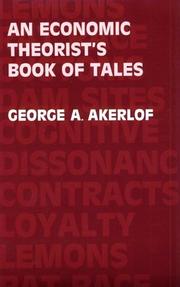| Listing 1 - 10 of 28 | << page >> |
Sort by
|

ISBN: 0199253900 0199253919 9780199253906 Year: 2005 Publisher: Oxford Oxford University Press
Abstract | Keywords | Export | Availability | Bookmark
 Loading...
Loading...Choose an application
- Reference Manager
- EndNote
- RefWorks (Direct export to RefWorks)
Economics --- Economics. --- 330.101 --- 330.1 --- Economische analyse. Economische methodologie. Economische onderzoeksmethoden--(theoretische economie) --- Economic theory --- Political economy --- Social sciences --- Economic man --- 330.101 Economische analyse. Economische methodologie. Economische onderzoeksmethoden--(theoretische economie) --- Économie politique. --- Économie politique --- Économie politique.
Book
Year: 2017 Publisher: National Bureau of Economic Research
Abstract | Keywords | Export | Availability | Bookmark
 Loading...
Loading...Choose an application
- Reference Manager
- EndNote
- RefWorks (Direct export to RefWorks)
Book
ISBN: 9780262027342 0262027348 0262323443 0262529858 148437875X Year: 2014 Publisher: Cambridge (Mass.) : MIT press,
Abstract | Keywords | Export | Availability | Bookmark
 Loading...
Loading...Choose an application
- Reference Manager
- EndNote
- RefWorks (Direct export to RefWorks)
Since 2008, economic policymakers and researchers have occupied a brave new economic world. Previous consensuses have been upended, former assumptions have been cast into doubt, and new approaches have yet to stand the test of time. Policymakers have been forced to improvise and researchers to rethink basic theory. George Akerlof, Nobel Laureate and one of this volume's editors, compares the crisis to a cat stuck in a tree, afraid to move. In April 2013, the International Monetary Fund brought together leading economists and economic policymakers to discuss the slowly emerging contours of the macroeconomic future. This book offers their combined insights. The contributors consider the lessons learned from the crisis and its aftermath. They discuss, among other things, post-crisis questions about the traditional policy focus on inflation; macroprudential tools (which focus on the stability of the entire financial system rather than of individual firms) and their effectiveness; fiscal stimulus, public debt, and fiscal consolidation; and exchange rate arrangements.
Monetary policy --- Fiscal policy --- Financial crises --- Economic policy --- Macroeconomics --- Government policy --- Monetary policy. --- Fiscal policy. --- Economic policy. --- Macroeconomics. --- Government policy. --- Financial crises - Government policy --- Global Financial Crisis, 2008-2009. --- ECONOMICS/Macroeconomics

ISBN: 0521269334 0521263239 0511609388 9780521263238 9780521269339 9780511609381 Year: 1990 Publisher: Cambridge Cambridge University press
Abstract | Keywords | Export | Availability | Bookmark
 Loading...
Loading...Choose an application
- Reference Manager
- EndNote
- RefWorks (Direct export to RefWorks)
These essays explore what happens when a skilful economist makes unconventional assumptions. Economic theory has traditionally relied upon a tacit and 'classical' set of assumptions that have gradually acquired a life of their own in defining how economists write and how they justify economic models. Similarly, these assumptions have acquired an autonomous character: they guide the way economists think about the world. In consequence, consideration of alternative assumptions has become taboo. These essays are substantively and stylistically novel because they break these taboos and bring new assumptions into economic theory. The papers apply this adventurous approach to a wide range of issues - from insurance markets and trade in underdeveloped countries to unemployment and discrimination. Some of the essays derive the implications for economic markets of costly asymmetric information. Others explore the findings of other social sciences such as anthropology, psychology and sociology.
Economics --- 330 --- Economic theory --- Political economy --- Social sciences --- Economic man --- 330 Theoretische economie. Economische theorie. Economische analyse --- Theoretische economie. Economische theorie. Economische analyse --- Methodology --- 330.1 --- 330.1 Economische grondbegrippen. Algemene begrippen in de economie --- Economische grondbegrippen. Algemene begrippen in de economie --- Methodology of economics --- Economie politique --- Méthodologie --- Mathématiques économiques --- Business, Economy and Management --- Economics - Methodology --- Economics. --- Methodology.
Book
Year: 1990 Publisher: Cambridge, Mass. National Bureau of Economic Research
Abstract | Keywords | Export | Availability | Bookmark
 Loading...
Loading...Choose an application
- Reference Manager
- EndNote
- RefWorks (Direct export to RefWorks)
Book
Year: 1989 Publisher: Cambridge, Mass. National Bureau of Economic Research
Abstract | Keywords | Export | Availability | Bookmark
 Loading...
Loading...Choose an application
- Reference Manager
- EndNote
- RefWorks (Direct export to RefWorks)
Book
Year: 1986 Publisher: Cambridge, Mass. National Bureau of Economic Research
Abstract | Keywords | Export | Availability | Bookmark
 Loading...
Loading...Choose an application
- Reference Manager
- EndNote
- RefWorks (Direct export to RefWorks)
Digital
Year: 2017 Publisher: Cambridge, Mass. National Bureau of Economic Research
Abstract | Keywords | Export | Availability | Bookmark
 Loading...
Loading...Choose an application
- Reference Manager
- EndNote
- RefWorks (Direct export to RefWorks)
This paper develops a theory of promotion based on evaluations by the already promoted. The already promoted show some favoritism toward candidates for promotion with similar beliefs, just as beetles are more prone to eat the eggs of other species. With such egg-eating bias, false beliefs may not be eliminated by the promotion system. Our main application is to scientific revolutions: when tenured scientists show favoritism toward candidates for tenure with similar beliefs, science may not converge to the true paradigm. We extend the statistical concept of power to science: the power of the tenure test is the probability (absent any bias) of denying tenure to a scientist who adheres to the false paradigm, just as the power of any statistical test is the probability of rejecting a false null hypothesis. The power of the tenure test depends on the norms regarding the appropriate criteria to use in promotion and the empirical evidence available to apply these criteria. We find that the scientific fields at risk of being captured by false paradigms are those with low power. Another application is to hierarchical organizations: egg-eating bias can result in the capture of the top of organizations by the wrong-minded.

ISBN: 9780691142333 0691142335 Year: 2009 Publisher: Princeton, N.J. Princeton University Press
Abstract | Keywords | Export | Availability | Bookmark
 Loading...
Loading...Choose an application
- Reference Manager
- EndNote
- RefWorks (Direct export to RefWorks)
Macroeconomics --- Economic order --- financiën --- sociale psychologie --- economie --- Economics --- Finance --- Capitalism. --- Globalization. --- Economie politique --- Finances --- Capitalisme --- Mondialisation --- Psychological aspects. --- Aspect psychologique --- Capitalism --- Globalization --- Psychological aspects --- AA / International- internationaal --- 330.00 --- 333.17 --- 333.78 --- N17 - Ouvrages généraux - Algemene werken --- 159.9 --- 33 --- -Finance --- -Capitalism --- 330.122019 --- Global cities --- Globalisation --- Internationalization --- International relations --- Anti-globalization movement --- Market economy --- Profit --- Capital --- Funding --- Funds --- Currency question --- Economic theory --- Political economy --- Social sciences --- Economic man --- Economische en sociale theorieën: algemeenheden. --- Crises, saneringen en hervormingen van het bankwezen. --- Kredietcontrole. Credit crunch. --- Psychologie --- Economie. Economische wetenschappen. Staatshuishoudkunde --(algemeen) --- 33 Economie. Economische wetenschappen. Staatshuishoudkunde --(algemeen) --- Behavioral economics --- Behavioural economics --- Economische en sociale theorieën: algemeenheden --- Crises, saneringen en hervormingen van het bankwezen --- Kredietcontrole. Credit crunch --- 33 Economics. Economic science --- Economics. Economic science --- Economics - Psychological aspects --- Finance - Psychological aspects
Book
ISBN: 9780691173023 9780691168319 0691168318 Year: 2015 Publisher: Princeton, N.J. Princeton University Press
Abstract | Keywords | Export | Availability | Bookmark
 Loading...
Loading...Choose an application
- Reference Manager
- EndNote
- RefWorks (Direct export to RefWorks)
Ever since Adam Smith, the central teaching of economics has been that free markets provide us with material well-being, as if by an invisible hand. In Phishing for Phools, Nobel Prize–winning economists George Akerlof and Robert Shiller deliver a fundamental challenge to this insight, arguing that markets harm as well as help us. As long as there is profit to be made, sellers will systematically exploit our psychological weaknesses and our ignorance through manipulation and deception. Rather than being essentially benign and always creating the greater good, markets are inherently filled with tricks and traps and will "phish" us as "phools." Phishing for Phools therefore strikes a radically new direction in economics, based on the intuitive idea that markets both give and take away. Akerlof and Shiller bring this idea to life through dozens of stories that show how phishing affects everyone, in almost every walk of life. We spend our money up to the limit, and then worry about how to pay the next month's bills. The financial system soars, then crashes. We are attracted, more than we know, by advertising. Our political system is distorted by money. We pay too much for gym memberships, cars, houses, and credit cards. Drug companies ingeniously market pharmaceuticals that do us little good, and sometimes are downright dangerous. Phishing for Phools explores the central role of manipulation and deception in fascinating detail in each of these areas and many more. It thereby explains a paradox: why, at a time when we are better off than ever before in history, all too many of us are leading lives of quiet desperation. At the same time, the book tells stories of individuals who have stood against economic trickery—and how it can be reduced through greater knowledge, reform, and regulation. George A. Akerlof is University Professor at Georgetown University and the winner of the 2001 Nobel Prize. Robert J. Shiller is Sterling Professor of Economics at Yale University, the winner of the 2013 Nobel Prize, and the author of the New York Times bestseller Irrational Exuberance (Princeton). Akerlof and Shiller are also the authors of Animal Spirits: How Human Psychology Drives the Economy, and Why It Matters for Global Capitalism (Princeton).
Economics --- Sociology of culture --- Psychology --- pratiques du commerce --- handelsgebruiken --- Economic order --- #SBIB:33H000 --- 330.00 --- Economie: algemene werken --- Economische en sociale theorieën: algemeenheden. --- Economie --- Hoger onderwijs. --- Free enterprise --- Psychological aspects --- Economische en sociale theorieën: algemeenheden --- Economics - Psychological aspects --- Free enterprise - Psychological aspects
| Listing 1 - 10 of 28 | << page >> |
Sort by
|

 Search
Search Feedback
Feedback About UniCat
About UniCat  Help
Help News
News